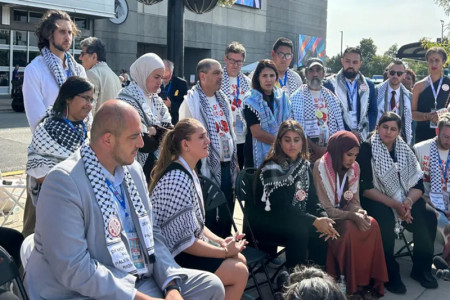Uncommitted delegates - who oppose US support of Israel's war in Gaza - began a sit-in protest just outside of the arena doors on Wednesday night.
But by 18:00 local time on Thursday - the deadline protesters had set to hear from Kamala Harris's campaign - activists said they had not received a response to their requests for a Palestinian to be allowed to take the stage.
The sit-in protest on the final night of the convention came as thousands of demonstrators outside the perimeter continued to rally against the war in Gaza and White House policy.
The demonstrations this week have been largely peaceful, except for a smaller, unsanctioned protest outside the Israeli consulate that led to 56 arrests.
"This has been a disastrous decision by the Democratic leadership to deny a bare-minimum ask that we requested weeks ago, prior to the convention," said Layla Elabed, a co-leader of the uncommitted national movement.
The Harris campaign told the BBC that campaign manager Julie Chavez Rodriguez had met leaders from the uncommitted movement in recent days.
"There have been a number of speakers who have spoken about the war in Gaza and the need to secure a ceasefire and hostage deal. You will continue to hear that message," a spokesperson said.
Uncommitted delegates were selected in state Democratic primaries earlier this year. President Joe Biden won an overwhelming share of primary voters, but pro-Palestinian activists urged people to vote "uncommitted" and similar options in a number of states.
Enough Democratic voters did so to send 30 delegates to the convention in Chicago, out of a total of more than 2,400 delegates.
Israel's war in Gaza has divided the Democratic Party, but has largely been avoided as a topic of discussion during the DNC this week.
The uncommitted protesters said they had given the Harris campaign a list of several potential Palestinians who could speak at the conference.
The activists said the Harris campaign sent aides and lawmakers to the sit-in protest outside the arena on Wednesday night to try to resolve the conflict, but they refused to offer a speaking slot.
Uncommitted activists said they were told that the focus of the convention was on the vice-president, as she prepared to give a speech that would be the "biggest of her life".
The delegates said they had been asking to have a Palestinian speaker address the crowd at the convention for two months.
"We're going to have to have a lot of difficult conversations with the vice-president and her team after this," said Abbas Alawieh, an uncommitted delegate from Michigan. "We're going to have to take stock of what happened."
Despite the large protests outside the arena doors, the war in Gaza has been mentioned by only a handful of speakers throughout the four-day programme.
Mr Alawieh said the goal of having a Palestinian speaker at the convention was about "forcing" the Democratic Party to "create space for talking about Palestinian human rights".
Minnesota Representative Ilhan Omar, an outspoken critic of US support of Israel, told the BBC she was not surprised the topic has not been featured much during the convention.
“Interestingly, foreign policy never really is a huge topic that’s talked about,” she said. “But I’ve always thought of foreign policy as domestic policy."
bbc


